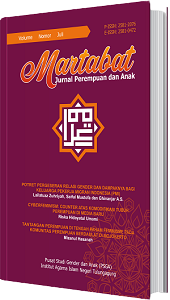Abstract
This research explores Asma Barlas perspective on gender justice in Islam, particularly in the context of Qur’anic interpretation. Barlas, through her work “Believing Women in Islam: Unreading Patriarchal Interpretations of the Qur’an,” offers a critical hermeneutic approach to traditional interpretations that tend to be patriarchal. A descriptive-analytical qualitative approach was used to analyze Barlas works and compare them with other interpretations. Data were collected through literature review and document analysis. Thematic analysis identifies and understands the main themes in Barlas interpretations, including the principles of gender justice she proposes. The results show that Barlas rejects the patriarchal view often found in traditional commentaries and asserts that the Qur’an, when read with a just and non-patriarchal approach, supports gender equality. The research also discusses the fundamental differences between Barlas' interpretation and traditional exegesis, as well as the potential impact of her thinking on the contemporary Islamic feminist movement. Challenges and criticisms of Barlas approach are analyzed to provide a balanced view of the strengths and limitations of her methodology. This research highlights the importance of an inclusive hermeneutic approach in Qur’anic exegesis and offers a new perspective for developing a more just understanding of gender in Islam.
References
Ahmed, L. Women and Gender in Islam: Historical Roots of a Modern Debate. Veritas Paperbacks, 2021.
Amallia, Siti. “Multiple Critiques as a Method of Progressive Muslim Thinking Confronting Plurality.” Lisan Al-Hal Jurnal Pengembangan Pemikiran Dan Kebudayaan (2022).
Arfa’in, Muhammad Caesar. “Analisis Egalitarianisme Asma Barlas Dalam Konsep ‘Sakinah’ Alimatul Qibtiyah.” Jurnal Riset Agama (2023).
Asadullah, M Niaz, Sajeda Amin, and Nazmul Chaudhury. “Support for Gender Stereotypes: Does Madrasah Education Matter?” The Journal of Development Studies (2018).
Barlas, A. Believing Women in Islam: Unreading Patriarchal Interpretations of the Qur’an. books.google.com, 2019. https://books.google.com/books?hl=en%5C&lr=%5C&id=8cSFDwAAQBAJ%5C&oi=fnd%5C&pg=PR9%5C&dq=%22asma+barlas%22%5C&ots=3ZvZFua9cw%5C&sig=ocl6rHKg5QPiMxt9puyGBLN3AOE.
———. “Secular and Feminist Critiques of the Qurʾan: Anti-Hermeneutics as Liberation?” Journal of Feminist Studies in Religion (2016). https://www.jstor.org/stable/10.2979/jfemistudreli.32.2.18.
Bauer, Karen. “The Male Is Not Like the Female (Q 3:36): The Question of Gender Egalitarianism in the Qur’?N.” Religion Compass 3 (2009): 637–654.
Doorn-Harder, Pieternella van. “Controlling the Body: Muslim Feminists Debating Women’s Rights in Indonesia.” Religion Compass (2008).
Ezzani, Miriam D, and Melanie C Brooks. “Culturally Relevant Leadership: Advancing Critical Consciousness in American Muslim Students.” Educational Administration Quarterly (2019).
Haque, Arina, Ahmad Izzuddin, Iffat Maimunah, Wildana Wargadinata, and Suo Yan Mei. “The DOMESTIC RIGHTS OF THE WIFE (Viewed From KH. Husein Muhammad’s Thoughts).” Egalita (2022).
Hidayatullah, Aysha A. “Feminist Edges of the Qur’an” (2014).
Keddie, Amanda. “Giving Muslim Girls ‘A Voice’: The Possibilities and Limits to Challenging Patriarchal Interpretations of Islam in One English Community.” Pedagogy Culture and Society (2009).
Koburtay, Tamer. “Misconceptions and Misunderstandings: An Exploration of the Interplay of Religion, Culture and Gender From Muslim Scholars and Clerics.” Career Development International (2023).
Koburtay, Tamer, Jawad Syed, and Radi Haloub. “Implications of Religion, Culture, and Legislation for Gender Equality at Work: Qualitative Insights From Jordan.” Journal of Business Ethics (2018).
Lestari, Puspita, Syamsul Hidayat, and Muthoifin Muthoifin. “The Values of Humanist Education in the Qur’an (Study of Tafsir Al-Azhar and Tafsir an-Nur)” (2022).
Mondal, Anshuman A. “Islam and Controversy” (2014).
Priola, Vincenza, and Shafaq Chaudhry. “Unveiling Modest Femininities: Sexuality, Gender (In)Equality and Gender Justice.” British Journal of Management (2020).
Reilly, Niamh. “Seeking Gender Justice in Post-Conflict Transitions: Towards a Transformative Women’s Human Rights Approach.” International Journal of Law in Context (2007).
Riyani, Irma, and Ecep Ismail. “QGOD IS BEYOND SEX/GENDERq MUSLIM FEMINIST HERMENEUTICAL METHOD TO THE Qur’an” (2018).
Wadud, Amina. “Reflections on Islamic Feminist Exegesis of the Qur’an.” Religions (2021).
Wasik, Abdul. “Tafsir Al-Qur’an Dalam Perspektif Kaum Feminis (Pemikiran Asma Barlas Dan Kontribusinya Terhadap Perkembangan Hukum Islam).” Al-Adillah (2023).
Yusuf, Muhammad, Achmad Abubakar, Mardan Mardan, Nahdhiyah Nahdhiyah, and Abdul Rahim. “The Dialogue of Multicultural Education and Harmony in Prosperity Based on the Qur’an.” International Journal on Advanced Science Education and Religion (2020).

This work is licensed under a Creative Commons Attribution-ShareAlike 4.0 International License.

